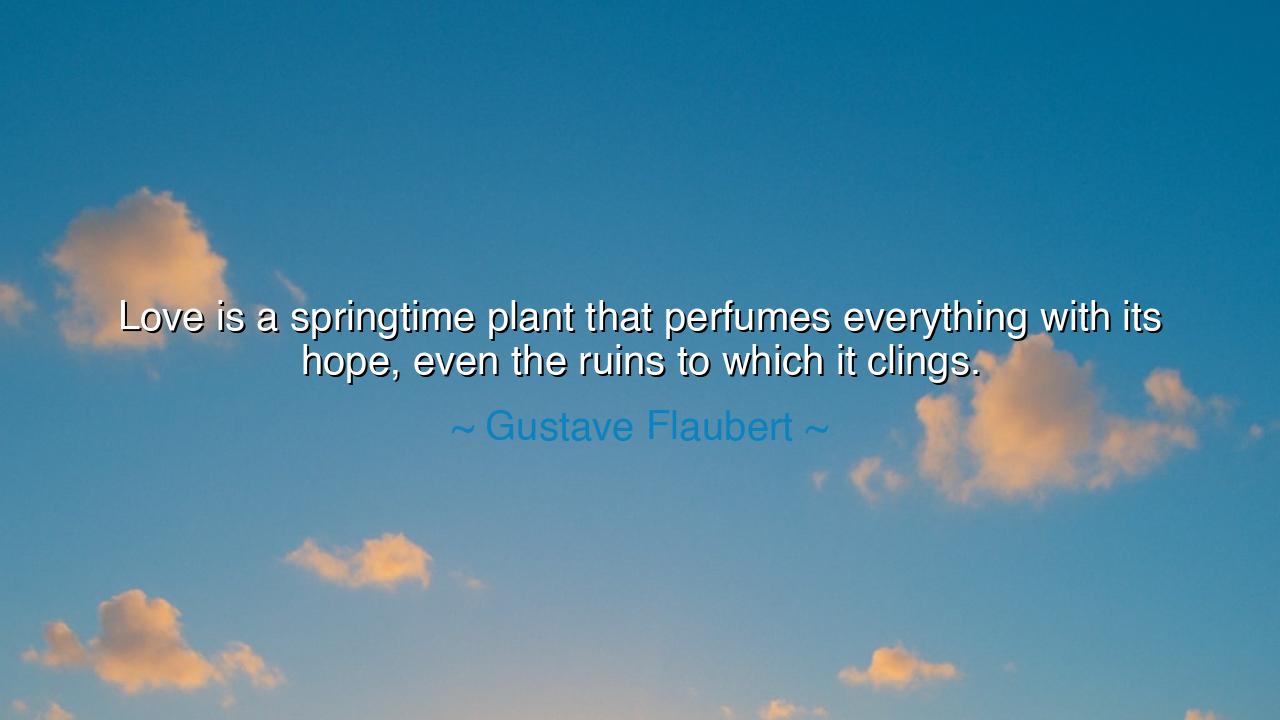
Love is a springtime plant that perfumes everything with its
Love is a springtime plant that perfumes everything with its hope, even the ruins to which it clings.






“Love is a springtime plant that perfumes everything with its hope, even the ruins to which it clings.” Thus wrote Gustave Flaubert, the master of words and observer of the human heart, whose vision pierced both the beauty and the tragedy of existence. In this sentence, Flaubert captures one of life’s most mysterious truths: that love, though fragile as a flower, possesses a strength that defies despair. It is the green shoot that rises from broken stone, the fragrance that lingers in the air long after all else has crumbled. His words speak to the eternal resilience of the heart—the power of hope that endures even in the shadow of loss.
When Flaubert calls love a springtime plant, he evokes the image of renewal, of life returning after the long cold of winter. For in every age, love has been the herald of beginnings. It softens the hardened soil of the soul, stirs the frozen rivers of emotion, and awakens what seemed forever dead. Yet, in his wisdom, Flaubert does not present love as naive or untested. The plant of which he speaks grows not only in gardens of joy but among ruins—among the wreckage of dreams, the decay of time, the remnants of sorrow. Still, it clings. Still, it blooms. Its perfume is not of innocence, but of endurance; not of youth, but of hope reborn through pain.
This truth has echoed through the ages in story and in life. Consider the tale of Antony and Cleopatra, whose love defied kingdoms and laws, yet ended amid ruin. Though their bodies fell and their empire perished, the memory of their love endures through centuries—a perfume rising from ashes. Their passion, born in grandeur and ended in tragedy, became something greater than either of them could have lived: a testament to the power of love to transcend destruction. The ruins of their lives became the garden from which myth and poetry still draw fragrance.
Or think of Anne Frank, a young girl imprisoned in the darkness of war, whose diary became a vessel of light. Amid the ruins of civilization, she wrote of love and hope, believing still in the goodness of humanity. Though hatred had reduced her world to rubble, the springtime plant of love bloomed within her heart. Her words, written in hiding, have perfumed generations with their sweetness and strength. She proved that even in the most desolate soil, love can live—not as a weakness, but as the last defiance of despair.
Flaubert’s imagery also reveals a deeper understanding of love’s nature. For love does not avoid suffering; it embraces it, transforming it. When it clings to ruins, it does not deny the past—it sanctifies it. Love says, “Though all is broken, I will remain. Though the walls have fallen, I will still grow here.” It is the force that redeems what was lost, turning grief into remembrance, failure into wisdom, ending into beginning. Thus, love is not simply an emotion but an act of faith—a belief that beauty can rise again, even from the ashes of what once was.
In this, Flaubert reveals love’s dual nature: tender yet tenacious, delicate yet immortal. The perfume it leaves is not for itself alone but for all who come near. It reminds us that life, though fleeting, carries within it a fragrance that outlasts death. To love truly, then, is to plant this springtime flower in the heart, even knowing it will one day cling to ruins. For in doing so, we become part of something eternal—the unending cycle of hope that renews the world.
So, my listener, learn from this wisdom: let love be your springtime plant. Tend it, not only in joy but in hardship. When life breaks you, do not pull it from your heart; let it grow among the ruins, and it will teach you to hope again. Remember that love’s strength is not in its ability to prevent pain, but in its power to transform it. When you love, you create meaning where there was none; when you love through sorrow, you turn ruins into sacred ground.
Thus, remember the lesson of Gustave Flaubert: that love perfumes even the darkest corners of life, carrying with it the scent of eternity. It is the green leaf upon the crumbled stone, the blossom that dares to grow in the shadow of despair. Let it cling to you, and you will never truly be broken. For as long as love endures, no ruin is final, and no heart is beyond rebirth.






AAdministratorAdministrator
Welcome, honored guests. Please leave a comment, we will respond soon